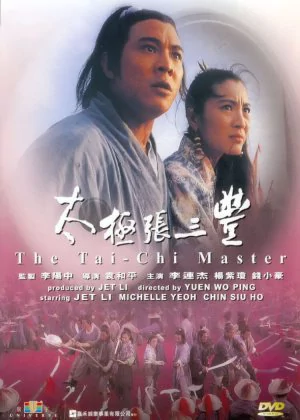Twin Warriors

Once you start exploring the world of Hong Kong martial arts cinema, it won't take long before your focus lands on the early 90s, with Woo-ping Yuen and Jet Li as prime representatives. Jumble all of that together, and you get Twin Warrior [Tai Ji Zhang San Feng], aka Tai-Chi Master. One of the lesser known classics I watched way back when I was getting a taste for the genre. I've been slowly revisiting some of its contemporaries, and they've held up remarkably well. I'm glad to say Twin Warriors continues that streak, though it's not quite up there with the very (very) best.
![screen capture of Twin Warriors [Tai Ji Zhang San Feng]](/thumbs/img/articles/1200xauto/twin-warriors-1.webp)
Jet Li may be the face that promoted many of these 90s wuxia films, guys like Hark Tsui, Corey Yuen and Woo-ping Yuen were the real drivers behind their success. While a fast and able lead martial artist is indispensable, the minutely timed direction and the creative action choreographies made these films into what they are. Woo-ping Yuen worked primarily as an action director/choreographer (most famously on the Matrix films), but he was also allowed to direct a few films of his own. Twin Warriors is one of his better efforts, not surprisingly also one of his most action-packed films.
What sets this film apart from its peers is the focus on Tai-Chi martial arts. It's different from the more popular and prevalent Shaolin styles in that it uses the strength of its opponent to create extra leverage. It's a more elegant and graceful style that may not seem very suited for the fast-paced martial arts action these films like to exploit, but Yuen's creative choreography (mixed with the usual light fantasy elements) makes this the true eye-catcher of Twin Warriors. The only real downside is that the style doesn't surface until the final third of the film, which leaves little time to explore it to its fullest.
The plot is very basic, but there's quite a lot of it. Junbao and Tienbao are two young boys who join a Shaolin monastery. Both are extremely skilled fighters and the two are inseparable. Tienbao has somewhat of temper and when a competing student cheats in a fight, Tienbao can't control himself. Junbao wants to help his brother out, but only makes things worse. The two are kicked out of the monastery and are told to roam the world. A scuffle in a nearby village drives the two boys apart. Tienbao joins the army, while Junbao sides with the rebels, a cruel fate that turns them into adversaries.
![screen capture of Twin Warriors [Tai Ji Zhang San Feng]](/thumbs/img/articles/1200xauto/twin-warriors-2.webp)
Almost all the early 90s Hong Kong martial arts films share a similar look, Twin Warriors is no exception. It is characterized by dynamic camera angles, a very agile camera and fast (but smart) editing that reinforces the action rather than destroying it. The difference between Yuen and more seasoned directors is that they pay a bit more attention to color and lighting, which gives their films more visual flair. If you're looking for atmospheric night scenes, epic hero shots or impressive battlefield vistas, Twin Warriors may be a little disappointing, but the fights themselves look every bit as dashing and impressive as needed.
As for the score, I'll admit that I drew a complete blank by the time I started writing this review. I skipped through the film once more and wasn't too surprised to find that the music hardly drew any attention to itself. It's the usual martial arts sound that works well enough for bringing a little extra kick to the action scenes, but it's such a staple of the genre that it almost completely disappears in the background. The sound effects are on point and add a little punch, but again, nothing beyond the expected. A missed opportunity, but very much in line with its peers.
Films like Twin Warriors don't require strong, emotional performances, they need skilled martial artists who can deliver hefty kicks, punches and jumps, ideally with prior rope experience. With Jet Li and Michelle Yeoh as the biggest headliners, Yuen can go absolutely nuts. Both actors deliver stellar performances and are key to the success of the film. Siu-Ho Chin, Fennie Yuen and Cheung-Yan Yuen offer solid back-up in secondary roles, even adding some comedic prowess to the film. Obviously, there are no award-winning performances here, but everybody is well aware of what's expected of them and executes accordingly.
![screen capture of Twin Warriors [Tai Ji Zhang San Feng]](/thumbs/img/articles/1200xauto/twin-warriors-3.webp)
Yuen has quite a bit of plot to wade through, clearly not one of his strong points. He tries to edge it in between the action scenes, but there's just too much to keep the pacing lean and mean. All this introductory nonsense keeps pushing the "technique mastery" scenes backwards, leaving relatively little room for the sprawling finale. It's not a fatal flaw, but it does get in the way of the fun and with Yuen focusing on a martial arts style that isn't that common, it's a shame we don't see more of it simply because it takes the lead character so long to finally master it.
Twin Warriors is unfiltered, unapologetic genre cinema. Yuen removed as much cruft as possible (even though he wasn't entirely successful) and focused all his attention on the action. Compared to the absolute best in the genre, Twin Warriors feels just a little bare-bones, but Jet Li and Michelle Yeoh are a delight to watch, the action choreography is spectacular and the mix of daft comedy and sprawling martial arts makes for amazing entertainment. An essential watch for fans of 90s Hong Kong martial arts cinema, others may be better off sampling the more famous films first.